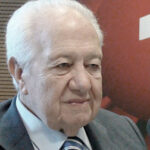It was not an easy task, but Soares’ endeavor, guided by his unflinching belief in democracy and his well deserved authoritas (he was imprisoned 12 times by the police of the military regime of General Antonio Salazar) was instrumental to allow a peaceful transition from a dictatorship to a modern democracy in Portugal.
His political and democratic credentials are astonishing: he was the first exile to return to Portugal after the Revolution of April 1974. He was Minister of Foreign Affairs in provisional Governments I, II and III – 1974-75 – in charge of negotiations leading to the independence of the Portuguese colonies. Then, he was appointed Prime-Minister of Constitutional Governments I and II from 1976-78. In that period (1977), he initiated negotiations leading to Portugal’s entry into the European Community, and years later he signed the Treaty of Accession (June 1985). He was again Prime-Minister of Constitutional Government IX and in January 1986, he became the first civilian President of the Republic of Portugal, and was re-elected in 1991 for a second 5 year term. He was Secretary-General of the Portuguese Socialist Party from 1973 until 1986 and also the Portuguese representative in the International League of Human Rights.
The Portuguese political democratic life in the last 40 years can not be explained without Mario Soares. After loosing the elections in 2006 against another Club de Madrid Member, Anibal Cavaco Silva, he kept a high public profile writing books and appearing regularly in the media. Soares will be missed, but he will also be remembered as a crucial democratic champion, or, as he is known in his homeland, the “father of Portuguese democracy”.
